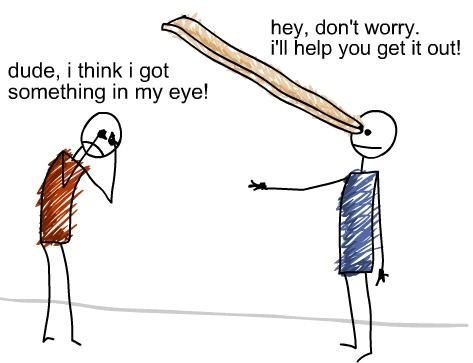It has been a long while since I have written. Laziness is similar to chaos, everything reverts to its natural state. Pretty much like most African politics, especially in good old South Africa... Anyway enough of that, its too depressing for me to face at the moment.
I was looking through one of my old articles on judgement and saw a missing aspect that I felt impressed to comment on.

Those who are familiar with the Bible will know this passage as found in Matthew chapter 7 in the "Sermon on the mount". I have put the first five verses below:
1 Judge not, that ye be not judged.
2 For with what judgment ye judge, ye shall be judged: and with what measure ye mete, it shall be measured to you again.
3 And why beholdest thou the mote that is in thy brother’s eye, but considerest not the beam that is in thine own eye?
4 Or how wilt thou say to thy brother, Let me pull out the mote out of thine eye; and, behold, a beam is in thine own eye?
5 Thou hypocrite, first cast out the beam out of thine own eye; and then shalt thou see clearly to cast out the mote out of thy brother’s eye.
Commentary to this section is plentiful but I hope that my insight may be of interest.
Firstly what is a mote?
Secondly, what is a beam?
A mote is a speck of dust, when you are in a dark room with light shining in through the window, or you use a torch at night, sometimes you can see a speck of light reflected against the gloomy background. That is how small a mote is.
A beam on the other hand, is a large long piece of wood used to hold up the roof.

Obviously there is no comparison in size between the two items in the illustration used by the Saviour.
The following picture is relevant in portraying my idea.

Most ideas that I see emphasise the size of the "sin" between the two parties, usually the "critical" person sees the mote in another person's eye. Then the critic offers to help the victim with the mote in the victim's eye while ignoring the larger problem in their own eye.
Seems a lot like politics in America; it seems easier to deal with foreign policy as compared to more difficult domestic policy. A lot of military "defending" takes place in far- away lands.
All situations in life where people interact with each other, or even where nations interact, it is always easier to "help" another.
To take an object out of my eye is much more painful when compared to doing the same task with another person's eyeball. Also I would be much more careful with my own sensitive eye than with another person's eye.
Pretty much like dealing with my own faults; a lot more self justification can occur. One of my favourite examples is the young married couple who do not have any of their own children' yet. Then this young, childless couple see another older couple with unruly kids, the younger couple is often critical and sometimes, foolishly, offer advice to the older couple. UNTIL THEIR OWN KIDS ARRIVE! Then the situation is different as deeper awareness evolves due to the difficulty of having their own feisty kids.
One of the primary criticisms leveled by the Saviour against the person with the beam in their eye is that they cannot see clearly (objectively) the exact nature of the fault of the other person. We judge (in general) with our outward observation faculties (primarily our eyes and ears). The Saviour, in contrast, judges with the spirit; He sees the inner feelings and desires of others, this is the ultimate technique of judgement, to see within another. Coupled to this is the immense love the Saviour has for us mortals, despite our weaknesses. To compare His infinite capacities with our limited mortal capacities, makes me realise that without love, His perfect love for us lowly creatures, there is no logical reason that He should love such puny and pathetic creatures that we are.
So the beam in our eye may just be the same size as the mote in the eye of another. The size is relative; that is why in the picture of the girl "holding" the moon between her two fingers is only possible because of the distance of the moon to our own eyes. Pretty much like our sins as compared to the sins of the other person. Our sins are much more relevant to deal with first. I reckon if we can look at ourselves through the lens of a divine being, we would see so many imperfections and faults to deal with, we would not really have time to deal with the faults of others as we think we see them. Much closer at home.
Yet the Saviour, with all of His perfections, chose to delay judging mankind while He was on earth performing his mortal ministry. That is a good course for us to follow, being tolerant of the weaknesses of others. The Saviour grew from grace to grace as the scriptures record. This impressive passage is meant to teach us that the Saviour started out as a baby, and had to learn all the things that all babies must learn; how to walk, talk, share things, learn how to obey His parents, the Mosaic code of conduct, how to work and so on, until He achieved and realised His divine potential. He lived this life to be the "perfect pattern" for us to follow.
He taught this concept in His sermon to His followers because He was showing them what they needed to do in their own lives. He gave us the seemingly impossible commandment; be ye therefore perfect as my Father in Heaven is perfect.
How do you eat an elephant? One bite at a time.
How do you get perfect? One step at a time.
Yet we cannot be perfect here, on our own, yet if we partner up with Jesus Christ, then we, as a partnership, His perfection and our little bit of goodness, become a perfect team. So are we not perfect, when linked up with Christ?
The answer is a clear and resounding yes.
So lets tie our own shoe laces before worrying about the shoe laces of another. Lets not fall flat on our own faces while rushing to help another. When the other party sees our tied shoe laces, then they know that you indeed know how to tie shoe laces and may be prepared to accept your help.


I am sure my analogy makes sense
You are right to follow the precepts of Christ, it means to carry faith and good to people, and the more people will believe, the more kind there will be. Thank you for the message, with the return @fred703
Welcome back @fred703 and your comparison review is very useful for all of us!
We can't be perfect. But the standard is perfection if you seek to be justified by the law.
You need to trust the perfected work of Christ. This act of faith is what saves. You don't add anything. The Bible calls our works filthy rags.
Posted using Partiko Android
certainly our works cannot save us but they can change us. The Gospel demands change. Just because our works are filthy rags compared to the incomparable works of Christ does not mean we must not strive diligently. Peter who professed to follow Christ (and he did so magnificently), yet he repeatedly stumbled. However it is clearly evident that he was not the same man at the end of his life that he was in the beginning. The words of Christ are paramount, Paul would be horrified that Christians in our day, choose his words over the Saviour, who he diligently followed. Who do you follow, Paul or Christ? Christ said, "if you love me, keep my commandments!" What about the man with a sandy foundation versus the man with a foundation of rock? I prefer to look to the words of Christ than words about Christ. What I am saying in no way negates the concept of faith and its vital role in salvation. The Saviour's life was one of service, love and sacrifice. He expects those who would be His disciples to follow Him. The half brother of Jesus, James, uses stern words to those who merely believe as compared to those who act.
For by grace are you saved through faith and that not of yourselves, it's the gift of God, not of works lest any should boast.
https://youtu.be/Wh1VU-_OF98
Very Nicely written... your writing can inspire many people.👍
Its really a nice blog because good faith is the key for success.
@originalwork